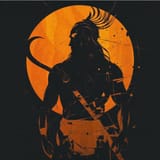Varna System: The World's First Separation of Church and State

Ancient India figured out separation of church and state three thousand years before America did. Most people think the varna system was just about "caste" hierarchy. Wrong angle entirely.
Varna doesn't mean caste. The varna system was in truth, the world's first institutional framework for keeping religious authority and political power in separate hands. The Brahmins ran the temples, the Kshatriyas ran the kingdom. Clean division of labor.
How did the Varna System work ?
The Brahmin wakes up at dawn. He performs the morning rituals, studies the Vedas, teaches students about dharma and conducts ceremonies for the community. He advises on spiritual matters. He maintains the moral framework of society. But here's what he doesn't do: he doesn't make laws about trade disputes. He doesn't command armies. He doesn't collect taxes. He doesn't amass riches.
The Kshatriya wakes up at dawn too. He reviews reports from his administrators, settles land disputes, plans military strategy, meets with merchants about trade routes and decides judicial cases. He protects the realm, enforces order, leads in war. But here's what he doesn't do: he doesn't perform religious ceremonies. He doesn't interpret sacred texts. He doesn't decide what the brahmin can and can't do.
Two completely different job descriptions. Two completely separate spheres of authority.
The genius was in the mutual dependency. The Kshatriya needed the Brahmin's spiritual legitimacy - a king without dharmic backing was just a warlord. The Brahmin needed the Kshatriya's protection and patronage - spiritual authority means nothing if barbarians are burning down your monastery.
But neither could do the other's job.
The thing about power structures is that the moment you let one person control both the spiritual realm and the temporal realm, you get either a theocracy or a personality cult. Ancient India saw this coming from miles away.
Think about what happens when roles get blurred.
The priest-king scenario: the religious leader starts making political decisions based on spiritual visions rather than practical governance. Result? Crusades, inquisitions, holy wars.
The divine king scenario: the political leader starts claiming religious authority, declaring himself a god. Result? Every totalitarian regime in history.
The varna system prevented both disasters by making role confusion literally impossible. Your dharma was your dharma. Step outside it, and you weren't just breaking social rules - you were violating cosmic order. The core insight - that religious authority and political authority need to remain in different hands - was brilliant.
Every organization needs this same division. The moment your CFO starts making artistic decisions or your creative director starts setting budgets, you're headed for trouble. Different types of authority require different skill sets and different temperaments.
Most modern democracies stumbled toward this realization through centuries of religious wars and political upheaval. Ancient India built it into the system from day one.
The Brahmin advised on what was righteous. The Kshatriya decided what was practical. Neither could override the other's domain completely, but neither could function without the other's input.
Here's what this looked like in a crisis: enemy armies approaching the border. The Kshatriya makes the military decisions - troop movements, battle strategy, diplomatic negotiations. But he consults the Brahmin on the dharmic implications - is this war just? What are the moral constraints on warfare? How do we maintain righteousness even in violence?
The Brahmin doesn't tell the king which hill to defend. The king doesn't tell the priest which prayers to offer. But both perspectives inform the final decision.
This is separation of church and state at its most sophisticated - not isolation, but specialization with built-in consultation mechanisms.





